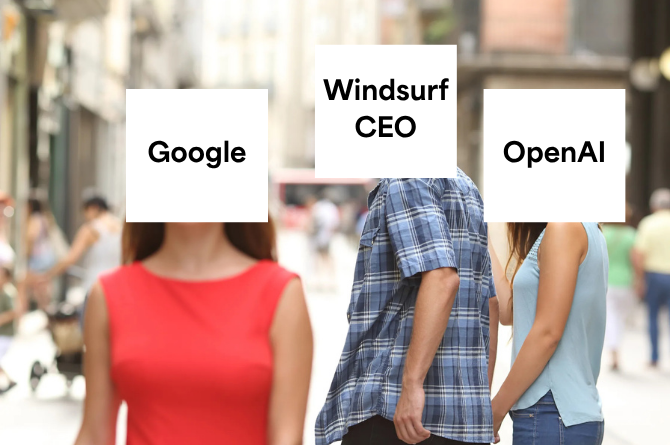July 20, 2025

I finally carved out a quiet night earlier this week. True to form, I ended up knee‑deep in a Succession rewatch. There I was, half expecting Logan to shout me off the couch, when our latest dividends hit my phone. Talk about timing.
Seeing those incredible payouts land while the Roys schemed on‑screen felt like proof we’re actually doing the thing they only brag about: building real value and sharing it with you all. Feels pretty good, but what's even better is knowing the best is yet to come.
- Alex Blackwood

Kiss Cam Catastrophe - Coldplay's concert turned into a real life rom-com disaster when the kiss cam spotlighted Astronomer CEO Andy Byron cozying up to his HR chief, Kristin Cabot, only for them to duck and dodge like they'd been caught robbing a bank. Frontman Chris Martin quipped they were either "having an affair or just very shy," as the pair scrambled to hide. Turns out, the former was correct, with Andy blaming Coldplay for showing them on camera and quoting one of their songs. Well, it's safe to say that somewhere, a divorce lawyer is probably humming "Fix You" while drafting papers.
Pentagon's AI Arsenal - The Pentagon just handed out up to $800 million in contracts ($200 million each) to Google, OpenAI, Anthropic, and Elon Musk’s xAI, aiming to bring cutting-edge AI deeper into national security. OpenAI will tailor ChatGPT for secure military use, Anthropic’s building interpretable models for classified work, Google’s rolling out secure cloud infrastructure with its AI chips, and xAI is deploying Grok-4 as a mission-focused agent. The deals mark a major moment for AI in defense and show that when it comes to military tech, hiring all the right brains is now as important as buying the right tools. Somewhere, a general is probably asking Grok how to conquer writer's block on battle plans.
Squid Game Showdown - Netflix's final Squid Game season was unsurprisingly a massive hit, clocking 106.3 million views in its first 10 days and helping the streamer smash Q2 earnings with $11.08 billion in revenue and a diluted EPS of $7.19. The dystopian hit propelled Netflix to hike its 2025 revenue guidance to $44.8 billion-$45.2 billion, but Wall Street didn't love that; the stock dipped 1.8% in after-hours trading as investors believed the outlook felt too conservative. Red light, green light?

If you thought tech industry moves were fast before, the AI talent wars are rewriting the playbook on speed and strategy. Windsurf, a rising star in AI development tools, was recently on the verge of being acquired by OpenAI in a $3 billion deal. That is, until last minute concerns about Microsoft’s access to Windsurf’s technology caused the talks to collapse. This dramatic turn then left the door wide open and set the stage for a strategic counterstrike from Google.
Not a Deal, But a Heist
Rather than going for a traditional acquisition, Google executed a move that felt more like a strategic raid. They lured away Windsurf’s CEO, co-founder, and a significant portion of its top engineering talent under a $2.4 billion arrangement that granted them non-exclusive licenses to Windsurf’s valuable technology.
Importantly, Google never bought Windsurf outright. Instead, they secured the brains behind the breakthroughs and key tech assets without taking on the whole company, sidestepping the usual regulatory scrutiny and integration challenges. This left Windsurf intact on paper, but hollowed out at the very top.
Cognition Steps In: Picking Up the Pieces
Windsurf’s independence was short-lived. Almost immediately after Google’s talent raid, Cognition, a bold challenger in the AI arena, stepped in and acquired the remaining Windsurf assets: the products, intellectual property, customer base, and those loyal employees who hadn’t jumped ship. This smart move allowed Cognition to bolster its AI toolkit, integrating Windsurf’s offerings with its own AI agent, Devin.
The New Playbook: Buy Brains, Not Brands
The Windsurf saga signals a significant shift in how tech giants grow and compete. Traditional acquisitions, where companies buy entire startups to absorb their technology and people, are giving way to a new model centered on aggressive talent raids and selective licensing deals. The founders and original teams no longer just build companies; they become the prized assets.
Google’s move isn’t an isolated incident; Meta, Amazon, OpenAI, and others are aggressively courting top AI talent and technologies piece-by-piece, creating an arms race to acquire the people best positioned to drive the next tech revolution.
Why This Matters: The Real Scarcity is People
As the AI arms race continues, the most precious resource is no longer data or hardware; it’s the human capital behind the innovations. For startup founders and investors, the Windsurf story is a cautionary tale about how quickly teams can be dismantled by bigger players eager to snap up talent.
For the industry, it means that future tech battles will be won not just with brilliant code, but with the ability to secure and retain elite teams amid fierce bidding wars. Whether you’re building your own AI startup or watching from the sidelines, the Windsurf episode is a vivid reminder that in 2025, success depends as much on winning the talent war as on building the next big product.
Welcome to a new era where the headline isn’t just about “who bought whom,” but “who hired whom,” and where the next breakthrough could hinge on a single recruitment call. The stakes are higher, the moves are faster, and the game has changed forever.


The Hugo is heating up, with over $200,000 already raised out of its $378,810 offering amount. This stunning Airbnb is a high-yield property with a proven track record and plenty of upside.
Positioned in the heart of the thriving Dallas metroplex, The Hugo is situated near top local attractions and numerous year-round demand drivers that ensures occupancy stays high throughout.
Highlights include:


Opening Meditations feels like finding a weather‑worn field manual for staying unflappable in chaos. Marcus Aurelius’s private notes aren’t lofty lectures; they’re pep‑talks scrawled between battlefield briefings by the once most powerful man in the world. One entry, “Stop arguing what a good man should be and just be one”, lands like a cold splash of water at 5 a.m. and kicks excuses to the curb.
You don’t need a philosophy minor to vibe with this. Each snippet is a quick jab at self‑pity, reminding you nothing outside your head deserves the keys to your mood. Read three pages...suddenly traffic, inbox meltdowns, and even that passive‑aggressive Slack ping lose their sting.
Sure, I hope more fresh takes on Stoicism pop up so the conversation broadens beyond, “Oh, you’ve read any philosophy? You know Meditations?” But if one classic has to carry the flag, this pocket‑sized powerhouse is worthy. It’s the kind of book you dog‑ear, underline, and keep within arm’s reach for the next time life tries to throw you off rhythm. It usually succeeds.
⭐ 4.74 / 5.0 in my book (no pun intended)

A. "“You can’t make a Tomlette without breaking a few Greggs.”
B. "I am the eldest boy!"
C. "If it is to be said, so it be…so it is."

Squid Game Season 3's 106.3 million views in 10 days is enough to fill every NFL stadium in the U.S. about 1,500 times over. If viewers were a country, they'd out-populate Canada by triple; no wonder Netflix is laughing all the way to the bank...

Written by Alex Blackwood & Thomas Horcel
Receive this weekly recap when you sign up for our platform